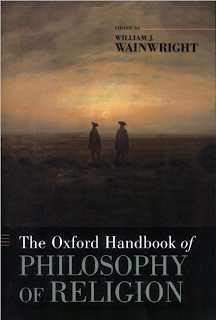"The Oxford Handbook of Philosophy of Religion" kan zonder Spinoza
Van de week kwam ik tussen allerlei google-hits een opvallend PDF tegen van een tamelijk recent boek dat vrij te downloaden staat tussen allerlei door de ‘Online Christian Library’ aangeboden sterk missionerende en apologetische werken. Het betreft _The_Oxford_Handbook_of_Philosophy_of_Religion.png)
Het is nogal zoeken in het overrompelende en verwarrend omvangrijke aanbod, daarom geef ik hier een rechtstreekse link naar het PDF voor de hierin geïnteresseerde bezoeker van dit blog. Ook al komt - en dat is eveneens merkwaardig hoewel niet uitzonderlijk - Spinoza’s uiterst kritische benadering van georganiseerde religie er niet in voor (z’n naam valt 2x zonder enige betekenis).
Het accent ligt op de Angelsaksische analytische benadering, maar Wainwright meent de inleiding: “There are some indications that analytic and continental philosophers of religion are beginning to learn from each other. One can only hope that this trend increases in the future.” Vervolgens vat hij samen: The Oxford Handbook of Philosophy of Religion is divided into two parts. Part 1 covers the most frequently discussed problems in the field. Part 2 consists of essays assessing the advantages and disadvantages of the four currently most influential ways of doing philosophy of religion; each is by a well-known practitioner of the way he or she discusses. The essays in Part 2 are a unique feature of this volume and are important for two reasons. First, one's philosophical approach affects one's selection of problems and the way one frames them, and this, in turn, affects one's results. For example, followers of Emmanuel Levinas or feminist philosophers of religion have different takes on the problem of evil than do analytic philosophers. No picture of the philosophy of religion that ignores them can be complete. Second, although the analytic approach dominates the practice of philosophy of religion in English-speaking countries and is beginning to make significant inroads on the continent, there are other historically important and potentially illuminating ways of doing philosophy of religion. It is therefore important that a general reference work of this sort acquaint the reader with the variety of approaches to the discipline.
De donker gemarkeerde passage geeft een indicatie waarom Spinoza’s benadering van religie in het boek niet voorkomt: er bestaat geen affiniteit mee.

